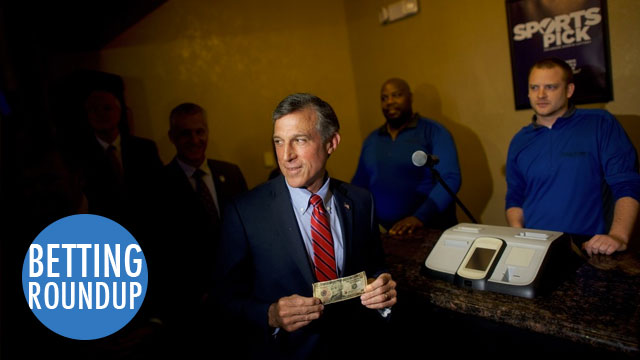Delaware sportsbooks took $322,135 of action on Tuesday, the day the state starting accepting legal sports bets.
While there were no championship events Tuesday, there was plenty of baseball. Delaware Gov. John Carney made the first wager, risking $10 on the Philadelphia Phillies to beat the Chicago Cubs. The Phillies won 6-1.
“For us, it’s really an enhancement of our tourism industry,” Carney told ESPN on Tuesday. “It will attract a lot of visitors to our state, particularly at this time of year, during the summer, coming to our beautiful beaches south of here. They come here and stop at the casinos and do slot machine and table gaming. This will be another opportunity for them.”
Deadspin’s Dan McQuade visited all three Delaware casinos on the first day of betting and shared his experience.
The odds boards are outdated, and they are state-of-the-art in Delaware.
The actual odds on them are up to date, mind you. But the boards themselves are nearly a decade old. That’s what Delaware Park president William Fasy told me after I placed one of the first legal bets in Delaware on Tuesday.
“These boards were bought eight years ago,” he said, pointing to giant LED screens showing odds for football, soccer, basketball and other sports. “And they’re no longer used anymore in Vegas. And they’re the best boards in Delaware!”
According to ESPN Chalk’s David Purdum, Congress is scheduling a sports betting hearing for later this month.
The hearing would follow comments made by Sen. Orrin Hatch (R-Utah) on potential federal legislation to replace PASPA. The Supreme Court struck down PASPA in May but left open the possibility of Congress creating new sports betting law.
The professional sports leagues’ lobbying efforts might be paying off in New York.
New York assemblyman J. Gary Pretlow introduced a sports betting bill Monday that includes a lot of what the leagues have been requesting: data rights, input on what types of bets are offered and a percentage of the amount wagered paid to the sports governing bodies in the form of a royalty.
“I do think they deserve something, because they produce the product,” Pretlow told ESPN on Tuesday. “I know [New] Jersey [didn’t] want to give them a dime, because the leagues were the ones who dragged them through the courts and cost them millions of dollars. I understand their position, but it’s better for me to have the support of the leagues rather than having them fighting me.”
New York State Sen. John Bonacic also is sponsoring a sports betting bill with similar beneficial stipulations for the leagues, who have sent a stream of former athletes and coaches to lobby on their behalf, including ex-New York Yankees managers Joe Torre and Joe Girardi.
An article published in the Wall Street Journal suggests that sportsbooks could lose when local teams win.
The overall economics for sports betting are relatively straightforward: Operators try to set the odds in such a way to entice equal amounts of money on each side. That can mean sweetening the deal for underdogs by widening the point spread needed for the favorite to win, or tweaking the payouts in other ways to make bets more attractive on both sides.
As long as the money on each side of the bet is close to even, the bookmaker or casino is well-positioned to earn money because of the transaction fee the operator charges.
However, popular local teams—such as the Golden Knights in Las Vegas—can make it tougher for casinos to find that split. That problem could crop up in several states expected to be the fastest adopters of regulated sports betting, such as New Jersey. For example, the NFL’s New York Giants or Philadelphia Eagles, both popular among New Jersey residents, could attract much more money than out-of-state opponents.
“We have to get it to where we can share the risk on a national basis,” said Vic Salerno, a longtime Las Vegas sports-betting executive who is the president of US Bookmaking, a Nevada sports-betting operation that is looking to expand to New Jersey and other states.
Sports Illustrated published an article about SEC schools preparing for the expansion of sports betting.
Meanwhile, league officials have at least briefly discussed the potential for standard, mandated injury reports across the conference, something that Andrews believes is needed. At many Las Vegas casinos like the one where he works, betting limits are lower for college games than for their NFL counterparts because of the lack of school-issued injury information during game week.
“Only thing we’re worried about right now is what will be the mandate for coaches and athletic departments to let us know what the injury situation is,” Andrews said. “We’ve been shooting in the dark all these years. We’re kind of used to that, but if it’s going to become something nationwide, they need to address that like the NFL.”
* * *
Each Friday, we’ll comb through as many articles, tweets and podcasts as we can find related to the world of sports betting and daily fantasy sports, and publish the good stuff here.
Stumble upon something you think we should include? Email info@bettingtalk.com.
